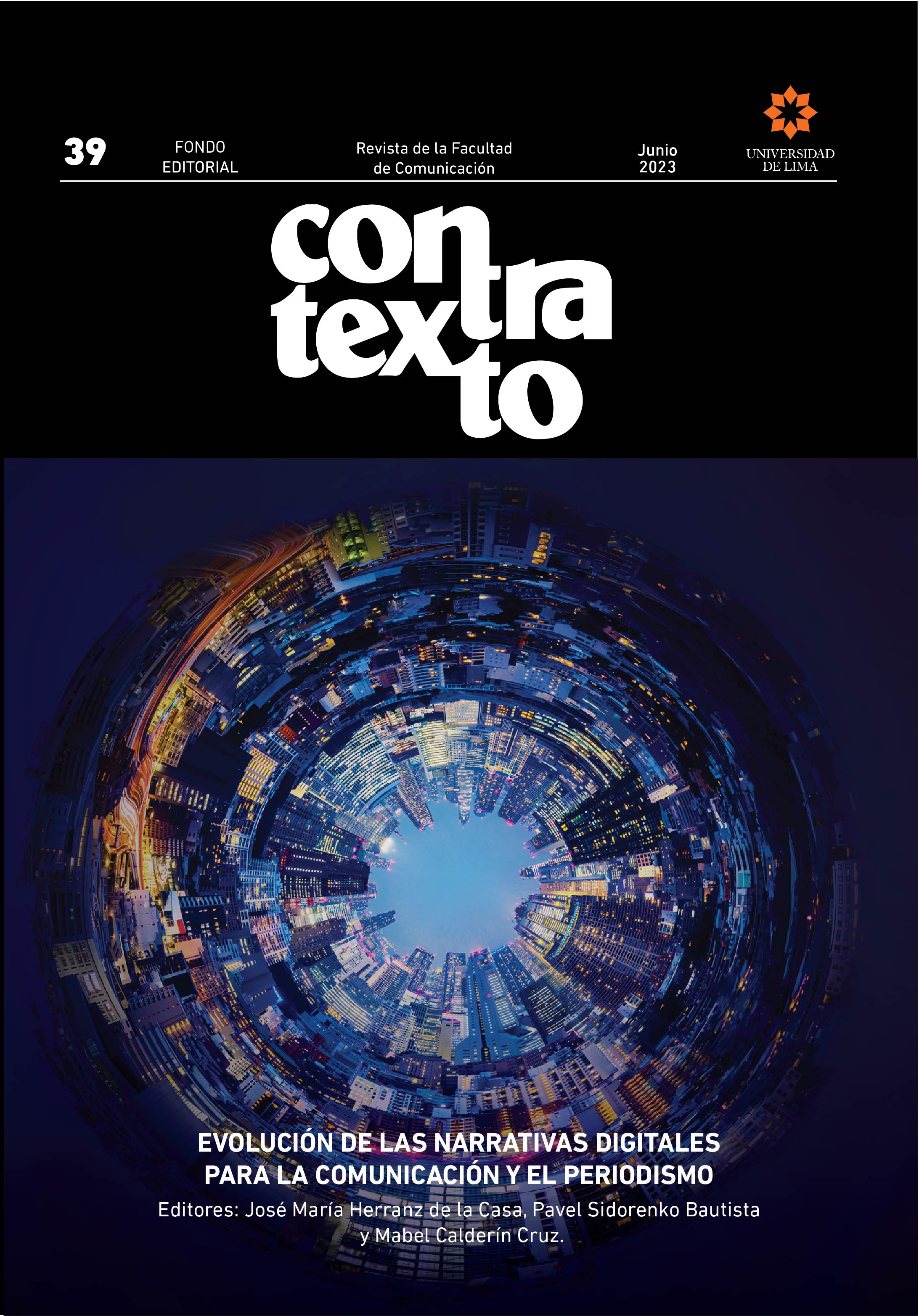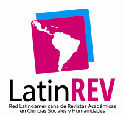Videojuegos y el aprendizaje del inglés: un estudio exploratorio sobre las percepciones de futuros docentes de inglés
DOI:
https://doi.org/10.26439/contratexto2023.n39.5867Palabras clave:
inglés como lengua extranjera, aprendizaje de un idioma extranjero, profesores en formación, videojuegos, habilidades del idiomaResumen
El presente estudio explora el conocimiento y las percepciones que setenta y dos profesores/as de inglés en formación, de nacionalidad chilena, tienen sobre el efecto de los videojuegos en su vida diaria y estudiantil, en términos del aprendizaje de un idioma extranjero. Al aplicar una escala de Likert de cinco puntos fue posible reunir información concerniente a sus características sociodemográficas y sus puntos de vista con relación a cinco dimensiones: (1) Experiencia general con videojuegos, (2) preferencias generales acerca de los videojuegos, (3) fortalezas y debilidades de los videojuegos, (4) videojuegos como una experiencia de aprendizaje y (5) videojuegos y las cuatro habilidades del idioma. Una vez que los datos fueron recopilados, se aplicó el análisis correlacional de Spearman para identificar relaciones entre las respuestas de los participantes. Se estableció que las cuatro habilidades lingüísticas, especialmente las receptivas, pueden ser practicadas mientras se juegan videojuegos. También, los juegos digitales permitieron a los/as participantes que enseñaran a otros jugadores/ as en línea y aprendieran de ellos/as a través del juego. Este proceso fue seguido de un análisis de conglomerados (cluster) jerárquico que asignó a los/as participantes en cuatro grupos sobre la base de las similitudes de sus respuestas.
Descargas
Referencias
Ashraf, H., Motlagh, F. G., & Salami, M. (2014). The impact of online games on learning English vocabulary by Iranian (low-intermediate) EFL learners. Procedia - Social and Behavioral Sciences, 98, 286-291. https://doi.org/10.1016/j. sbspro.2014.03.418
Aune, M. (2019). Pre-service teachers’ views on the use of computer games in the EFL classroom. [Bachelor’s thesis, Norwegian University of Science and Technology]. NTNU Open. http://hdl.handle.net/11250/2610411
Benson, P. (2011). Language learning and teaching beyond the classroom: An introduction to the field. In P. Benson, P. & H. Reinders (Eds.), Beyond the language classroom (pp. 7-16). Palgrave Macmillan. https://doi.org/10.1057/9780230306790_2
Bolliger, D. U., Mills, D., White, J., & Kohyama, M. (2015). Japanese students’ perceptions of digital game use for English-language learning in higher education. Journal of Educational Computing Research, 53(3), 384-408. https://doi.org/10.1177/0735633115600806
Bytheway, J. (2014). In-game culture affects learners’ use of vocabulary learning strategies in massively multiplayer online role-playing games. International Journal of Computer-Assisted Language Learning and Teaching (IJCALLT), 4(4), 1-13. https://doi.org/10.4018/ijcallt.2014100101
Bytheway, J. (2015). A taxonomy of vocabulary learning strategies used in massively multiplayer online role-playing games. CALICO Journal, 32(3), 508-527. https://doi.org/10.1558/cj.v32i3.26787
Chen, H. H. J., Chen, M. P., Chen, N. S., & Yang, C. (2012). Pre-service teachers’ views on using adventure video games for language learning. In P. Felicita (Ed.), Proceedings of the 6th European Conference on Games Based Learning (pp. 125-130). Academic Publishing International Limited Reading. https://www.researchgate.net/publication/286658088_Preservice_teachers’_views_on_using_adventure_video_games_for_language_learning
Chen, H. H.-J., & Huang W. Y.-C. (2010). Examining the potentials of computer games for English learning. Third IEEE International Conference on Digital Game and Intelligent Toy Enhanced Learning (pp. 134-138). IEEE. https://doi.org/10.1109/digitel.2010.35
Cheng, M.-T., Lin, Y.-W., & She, H.-C. (2015). Learning through playing virtual age: exploring the interactions among student concept learning, gaming performance, in-game behaviors, and the use of in-game characters. Computers & Education, 86 (1), 18-29. https://doi.org/10.1016/j.compedu.2015.03.007
Chen, H. J. H., & Yang, T. Y. C. (2013). The impact of adventure video games on foreign language learning and the perceptions of learners. Interactive Learning Environments, 21(2), 129-141.
Chik, A. (2014). Digital gaming and language learning: autonomy and community. Language, Learning and Technology, 18(2), 85-100. http://dx.doi.org/10125/44371
Chik, A., & Ho, J. (2017). Learn a language for free: recreational learning among adults. System, 69, 162-171. https://doi.org/10.1016/j.system.2017.07.017
Godwin-Jones, R. (2018). Chasing the butterfly effect: informal language learning online as a complex system. Language Learning & Technology, 22(2), 8-27. https://doi.org/10125/44643
Jabbari, N., & Eslami, Z. R. (2019). Second language learning in the context of massively multiplayer online games: a scoping review. ReCALL, 31(1), 92-113. https://doi.org/10.1017/s0958344018000058
Kongmee, I., Strachan, R., Pickard, A., & Montgomery, C. (2012). A case study of using online communities and virtual environment in massively multiplayer role playing games (MMORPGs) as a learning and teaching tool for second language learners. International Journal of Virtual and Personal Learning Environments (IJVPLE), 3(4), 1-15. http://doi.org/10.4018/jvple.2012100101
Krashen, S. D. (1987). Principles and practice in second language acquisition. Prentice-Hall International.
Lee, J. Y., & Pass, C. (2014). Massively multiplayer online gaming and English language learning. In H. R. Gerber & S. S. Abrams (Eds.), Bridging Literacies with Videogames. SensePublishers (pp. 91-101). https://doi.org/10.1007/978-94-6209-668-4_6
Lee, Y. J., & Gerber, H. R. (2013). It’s a WoW world: second language acquisition and massively multiplayer online gaming. Multimedia-Assisted Language Learning, 16(2), 53-70. https://doi.org/10.15702/mall.2013.16.2.53
Li, J. (2019). A systematic review of video games for second language acquisition. In P.M. Sullivan, J. L. Lantz & B. A. Sullivan (Eds.), Handbook of Research on Integrating Digital Technology With Literacy Pedagogies (pp. 472-499). IGI Global. https://doi.org/10.4018/978-1-7998-0246-4.ch021
Livingstone, D. W. (2006). Informal learning: conceptual distinctions and preliminary findings. In Z. Bekerman, N. C. Burbules & D. Silberman-Keller (Eds.), Learning in Places: The Informal Education Reader (pp. 203-227). Peter Lang AG. https://www.jstor.org/stable/42979596
Manero, B., Torrente, J., Freire, M., & Fernández-Manjón, B. (2016). An instrument to build a gamer clustering framework according to gaming preferences and habits. Computers in Human Behavior, 62, 353-363. https://doi.org/10.1016/j.chb.2016.03.085
Matijević, M., & Topolovčan, T. (2019). Informal learning among teenagers through video games: a qualitative analysis of experiences, game modes and didactic benefits. Journal of Elementary Education, 12(1), 1-25. https://journals.um.si/index.php/education/article/view/180
Newgarden, K., & Zheng, D. (2016). Recurrent languaging activities in World of Warcraft: skilled linguistic action meets the Common European Framework of Reference. ReCALL, 28(3), 274-304. https://doi.org/10.1017/S0958344016000112
Padaya, A., & Chbaklo, H. (2022, December). Innovation & integration of video games in education [Conferencia]. Innovation & Integration of Video Games in Education, Bournemouth University, United Kingdom. https://www.researchgate.net/publication/366310631_Innovation_Integration_of_Video_Games_in_Education
Peterson, M. (2012). Language learner interaction in a massively multiplayer online role-playing game. In H, Reinders (Ed.), Digital Games in Language Learning and Teaching. New Language Learning and Teaching Environments. Palgrave Macmillan. https://doi.org/10.1057/9781137005267_5
Rama, P., Black, R., Van Es, E., & Warschauer, M. (2012). Affordances for second language learning in World of Warcraft. RECall, 24(3), 322-338. https://doi.org/10.1017/S0958344012000171
Rankin, Y. A., Gold, R., & Gooch. B. (2006). 3D role-playing games as language learning tools. Eurographics (Education Papers), 25(3), 33-38. https://doi.org/10.2312/eged.20061005
Reinders, H., & Wattana, S. (2011). Learn English or die: the effects of digital games on interaction and willingness to communicate in a foreign language. Digital Culture & Education, 3(1), 4-28. https://doaj.org/article/26da2588091545c4a505cb6aaa2dca80
Reinhardt, J. (2021). Not all MMOGs are created equal: a design-informed approach to the study of L2 learning in multiplayer online games. In M. Peterson, K. Yamazaki & M. Thomas (Eds.), Digital Games and Language Learning: Theory, Development and Implementation (pp. 69-88). Bloomsbury Academic. https://doi.org/10.5040/9781350133037.ch-004
Rudis, D., & Poštić, S. (2018). Influence of video games on the acquisition of the English language. Verbum, 8, 112-128. https://doi.org/10.15388/Verb.2017.8.11354
Ryu, D. (2013). Play to learn, learn to play: language learning through gaming culture. ReCALL, 25(2), 286-301. https://doi.org/10.1017/S0958344013000050
Silva, R. L. (2014). Video games as opportunity for informal English language learning: Theoretical considerations. The ESPecialist, 35(2), 155-169. https://www.semanticscholar.org/paper/Video-Games-as-opportunity-for-informal-English-Silva/39af412128fb0c4120caa5dd8dd7dfbab8f931d3
Thorne, S. L. (2008). Transcultural communication in open internet environments and massively multiplayer online games. In S. Magnan (Ed.), Mediating Discourse Online (pp. 305-327). John Benjamins Publishing Company. https://doi.org/10.1075/aals.3.17tho
Vahdat, S., & Rasti, A. (2013). The effect of video games on Iranian EFL learners’ vocabulary learning. The Reading Matrix, 13(1), 61-71. http://www.readingmatrix.com/articles/april_2013/vahdat_behbahani.pdf
Vygotsky, L. S. (1980). Mind in Society: The development of higher psychological processes. Harvard University Press.
Publicado
Número
Sección
Licencia
Todos los trabajos publicados están sujetos a una licencia CC BY 4.0 Creative Commons (actualizado el 1 de marzo de 2021).
El contenido de la revista se puede compartir en cualquier material o formato. Asimismo, se puede adaptar, contribuir y transformar. Ambas posibilidades sólo están permitidas en la medida en que cumplan las siguientes condiciones:
- Atribución: Se debe otorgar crédito donde sea debido, proporcionar un enlace a la licencia e indicar los cambios en caso se realice alguno. Esto debe hacerse de la manera que se considere apropiada, sin sugerir que el licenciante lo promueva a usted o su uso del material.
Derechos de propiedad
Los derechos patrimoniales de Contratexto se publican bajo una licencia Creative Commons BY 4.0, lo que permite a los autores mantener los derechos patrimoniales de su obra sin restricciones.
Si un trabajo publicado en Contratexto fuera copiado, distribuido, difundido o cualquier otra actividad contemplada en la licencia antes mencionada, se deberá mencionar de manera visible y expresa al autor o autores y a la revista.
Auto-archivo
Esta revista permite y anima a los autores/as a publicar artículos enviados a la revista en sus sitios web personales o en depósitos institucionales, tanto antes como después de su publicación en esta revista, siempre y cuando proporcionen información bibliográfica que acredite, si procede, su publicación en ella.






















